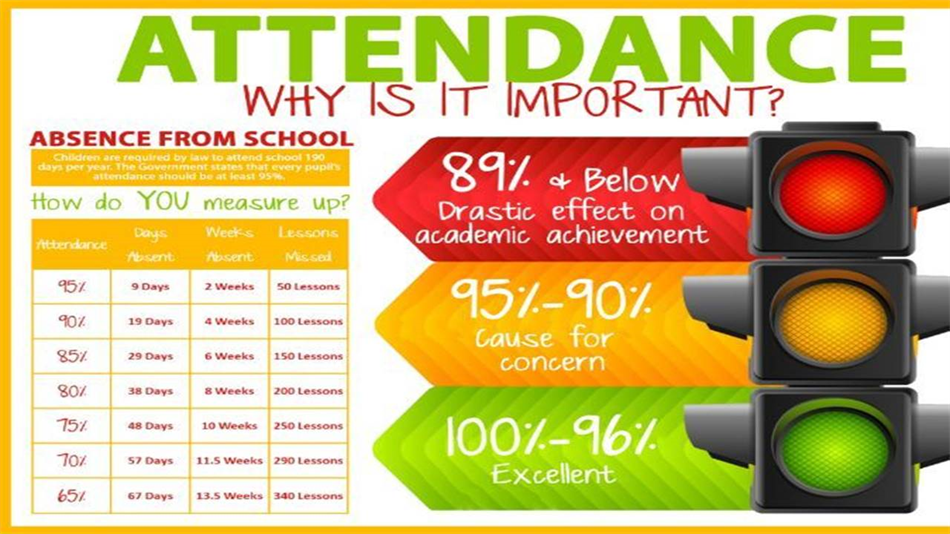 The School Day
The School Day
Our school day runs from 8.55am until 3.30pm.
Registers close at 9am and after this point your child will be marked as late, and after 9.10am as absent for this session.
The early bird activities run from 8.45am - 9.00am, so we urge you to have your children in school for 8.45am.
Why attendance is so Important
Being around teachers and friends in a school environment is the best way for pupils to learn and reach their potential. Time in school also keeps children safe and provides access to extra-curricular opportunities and pastoral care. We often find that children with poor attendance need significant pastoral support to settle in school.
How does attendance affect outcomes for pupils?
Being in school is important to your child’s achievement, wellbeing, and wider development
Research found that pupils who performed better both at the end of primary school missed fewer days than those who didn’t perform as well.
The data also shows that in 2019, primary school children in Key Stage 2 who didn’t achieve the expected standard in reading, writing and maths missed on average four more days per school year than those whose performance exceeded the expected standard.
What are the risks of missing a day of school?
Every moment in school counts, and days missed add up quickly.
Data from 2019 shows that 84% of Key Stage 2 pupils who had 100% attendance achieved the expected standard, compared to 40% of pupils who were persistently absent across the key stage.
What if my child needs to miss school?
Parents and carers have a legal duty to ensure your child gets a full time-education. Usually, that means going into school from the age of 5 to 16.
There are only a small number of circumstances where missing a school day is permitted. Your child must attend every day that the school is open, unless:
- Your child is too ill to attend.
- You have asked in advance and been given permission by the school for your child to be absent on a specific day due to exceptional circumstances.
- Your child cannot go to school on a specific day because they are observing a religious event.
Please read our Attendance and Absence policy here:
Attendance and Absence Policy
Leave of absence
The school will not authorise any absences in the following circumstances:
- Immediately before and during statutory assessment periods
- When a pupil’s attendance record shows any unauthorised absence
- Where a pupil’s authorised absence is 95 percent or below
- For the purpose of holidays.
The school may only grant leave of absence for exceptional circumstances.
Examples of any exceptional circumstances where leave may be granted during term time are as follows:
- Illness and healthcare appointments
- Performance Excellence
- Religious observance
- Gypsy, Roma and Traveller absence
- Service Personnel - only If a parent can evidence they are returning from a tour of duty, where it is evidenced the individual will not be in receipt of any leave in the near future that coincides with school holidays.
- Weddings and Funerals of close family members
- Bereavement and Compassionate Leave due to the death or terminal illness of a close family member or an absence due to a family emergency
Any requests for leave during term time will be considered in line with the above policy and we urge parents to read this policy carefully before they submit a request for leave.
Application for Leave of Absence in Exceptional Circumstances
Holidays In Term Time:
Taking holidays in term time will affect a child’s schooling as much as any other absence.
There is NO automatic entitlement in law to time off in school time to go on holiday.
New DFE guidance released in August 2024 on attendance in school is outlined below. We recommend parents read this carefully before booking holidays or considering any unauthorised absences.
Penalty notices and legal intervention
Where parents do not comply with this policy, and a pupil reaches the national threshold of 10 sessions (5days) of unauthorised absence in a rolling period of 10 weeks, the school has a duty to inform the local authority.
A fixed penalty notice will then be issued by the local authority in line with the their code of conduct and the DfE’s ‘Working together to improve school attendance’ guidance.
Penalty notices for unauthorised absences will be charged at £160, reduced to £80 if paid within 21 days.
A penalty notice of £120 may also be issued where parents allow their child to be present in a public place during school hours without reasonable justification during the first five days of a fixed period or permanent exclusion. This will be reduced to £60 if paid within 21 days.
Parents will only get up to two fines for the same child in a three-year period. Once this limit has been reached, other action such as a parenting order or prosecution will be considered.
Where attendance still does not improve following a fixed penalty notice, the school will work with the LA to take forward attendance prosecution as a last resort.
Parents who are prosecuted and attend court because their child has not been attending school may be fined up to £2,500.

Attendance and your child: